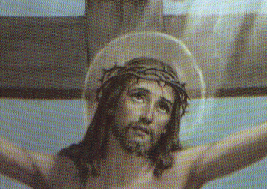
The prayer of Jesus
The synoptical Gospels, that is Matthew, Mark and Luke, they remember that in the frenetic rhythm of Jesus' days, there are always some times for praying. (Mk 1,35; 6,46).
Jesus prays in those moments of the day in which is more easy seclude himself. For example, at dawn he leaves Capernaum to go up the surrounding hills, and so he can contemplate the heavenly Father lovingly.
Jesus prays breathing and liking silence and peace, in the background of the dawn rises behind the hill of Galilee see.
In all important and decisive moments of his revelation and mission, Jesus prayes showing a deep union with the Father that he calls: "Abba", which means: "Daddy", "Pa", etc.. This happens when Jesus is baptized by John (Lk 3,21), in the moment of his transfiguration (Lk 9,28), in the Gethsemane, on the cross, before electing the twelve disciples (Lk 6,12), before Peter confession happened near Cesarea Philippi (Lk 9,18), before performing his miracles and prodigies (Mk 6,41; 7,34; 8,6-7; Jn 11,41-42), in the dinner of his passion (Jn 17) and in so many moments that only angels can list.
Jesus prays the Father calling him by the family name: "Abba". For the first time in the Biblic history, an hebrew is using this term to invoke God. In this manner, Jesus reveals "the only, singly communion with God. Jesus' prayer involves his to be Son that emerges in the conscience and it becomes colloquy. Conscious of his divine filiation, only, unrepeatable, unshared mystery, Jesus loves to pray in the solitude, only in front of the Father. This prayer in the solitude expresses his only communion with the Father and his nostalgia of the Father (Bruno Maggioni, Preghiera, in Nuovo Dizionario di Teologia Biblica, ed. Paoline, p.1222).
"But exactly because it's filial, Jesus' prayer is obedient. It's at the same time the prayer of the Son and of the Servant of Lord. In the prayer of Gethsemane, where more clearly than elsevhere he expresses his confidence of Son, Jesus feels his obedience by the same fortitude: "Not that I want, but that you want" (Mk 14,36). Conscience of his filiation and entire dependence are the two poles of Jesus' prayer, and they are - more first - the essential structure of his person. Jesus' prayer springs by the depth of his person. In the prayer, everybody discloses what he is" (Bruno Maggioni, Preghiera, in Nuovo Dizionario di Teologia Biblica, ed. Paoline, p.1222).
In the prayer, Jesus "rediscovers his own mission and finds the neatness of his own choices" (Ibid). (Mk 1,38; Lk 4,42-43). After the multiplication of the loaves, Jesus goes away from the enthusiastic people, whom want proclaim him King. So he retires for praying in the solitude (Mk 6,46).
Jesus' prayer is impregnated of biblical reminiscences. He prays mentioning the Holy Writings "even in the painful events of his life, like on the Calvary he mentions the psalm 22, the suffering Just prayer: "My God, my God, why do you have abandoned me?" (Mk 15,34), but at the same time, he shows himself committed into the hands of the Father: "Father, into thy hands I commit my spirit" (psalm 31.6; Lk 23,46).
Now somebody is asking: "How is Jesus' prayer?". Well, Jesus prays by various and diversified manners.
First of all, Jesus says "the prayer of benediction, laudation and contemplation. In the Hebraism this is the most excellent prayer. It expresses recognition, thanks, and admiration. In the synoptical Gospels there's this prayer of benediction: "I thank thee, Father, Lord of heaven and earth,That thou hast hidden these things from the wise and understanding and revealed them to babies; yea Father, for such was thy gracious will" (Mt 11,25-26; Lk 10,21).(Ibid p.1223).
After, there is the prayer of "demand", which, as regards Jesus, ever is individual, but it is sayed in a apostolic and universal view: Jesus says to Peter apostle: "I have prayed for you that your faith may not fail" (Lk 22,32). Jesus says: "And I will pray the Father, and he will give you another Counsellor, to be with you for ever..." (Jn 14,16). Besides Jesus prays so: "Father, forgive them; for they know not what they do" (Lk 23,34). After all, great sacerdotal Jesus' prayer, mentioned in John chapter 17, is very important, beautiful and significant.
At last, but not last, there is the prayer sayed by Jesus in the Gethsemane. It's a supplication to his Father which expresses, on the other side of the dramatic moment before his capture, the confidence and the consciousness of his own filial relation with "Abba", that is the Father (Mk 14,36).
In Jesus' prayers there are not sayed sentences about "the prayer of the fault or of the forgiveness: <<Jesus prays - K. Adam says - like somebody doesn't knows sin>>"(Bruno Maggioni, Preghiera, in Nuovo Dizionario di Teologia Biblica, ed. Paoline, p.1224).
"Father, the hour has come, glorify thy Son that the Son may glorify thee, since thou hast given him power over all flesh, to give eternal lifeto alla whom thou hast given him. And this is eternal life, that they know thee the only true God, and Jesus Christ whom thou hast sent "(Jn 17,1-3).
TO THE DISCOVERY OF JESUS OF NAZARETH